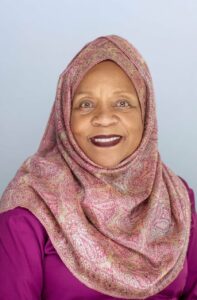
Fatimah Collier Jackson – Photo Credit, Howard University
Fatimah Collier Jackson was born in Denver, Colorado in 1950. Her maternal great-grandmother was a Choctaw Native American of the Bell Clan and a traditional herbalist and midwife. Growing up, Jackson’s family was poor, but she had a large, close-knit extended family that provided a sense of community. Her mother and aunt both had master’s degrees, so she learned to value education at an early age. The family also regularly visited the local library to check out books. Jackson would later say “we had holes in the carpet, but we had books on the shelves…the idea was, sit down and read, or sit down and think.” She spent lots of time during her childhood reading, roaming through the Rocky Mountain region, and thinking about the natural world. Jackson’s father died when she was six years old and she grew up in a house with her mother, grandmother, and aunt; the three would later form a long-distance support system when she moved away from home to attend college.
Jackson enrolled first at the University of Colorado in Denver, then transferred to Cornell University after finding the anthropology curriculum and instruction at UC to include racist elements. She also had a strong sense that she needed to move away from home in order to grow both personally and academically. At Cornell she received financial assistance, excelled in her classes, and earned the honor of cum laude with Distinction in all subjects upon graduation. She also met her future husband, Robert Jackson during her undergraduate years at Cornell where the two students helped each other to navigate academia. After completing her bachelor’s degree, Fatimah Jackson continued her studies at Cornell and she and her husband moved to East Africa to do research and collect data. While in Tanzania in 1974, Jackson contracted and nearly died of malaria – she was temporarily blind and unable to walk – but recovered, and the experience led her to research malaria throughout her career. After three years in East Africa, she and her husband returned to Cornell to write up their research and she earned a master’s degree in 1978. The couple then travelled to West Africa and lived there for two years; while working in Liberia, Jackson noticed a connection between cassava consumption and a lower incidence of malaria. Since then, she has continued to study human-plant coevolution and the relationships between plants, people, and disease. Her dissertation project was entitled, The Relationship of Certain Genetic Traits to the Incidence and Intensity of Malaria in Liberia, West Africa.
Jackson received a Doctorate in Anthropology in 1981 and, that same year she became an Assistant Professor in the Department of Anthropology at University of California, Berkley. Then in 1986 she became an Associate Professor of anthropology at the University of Florida. In 1990, Jackson joined the faculty of the Department of Anthropology at University of Maryland, College Park where she taught for 20 years, receiving a Distinguished Scholar Teacher Award there in 1995. While still teaching at UMD, she also held the position of professor and director in biological anthropology at the University of North Carolina, Chapel Hill from 2009-2011. Then in 2013, after becoming Professor Emerita at University of Maryland, Jackson became a professor of biology and the director of the W. Montague Cobb Research Laboratory at Howard University. In addition to human-plant coevolution, she studies genetics in populations of African descent including microethnic groups and expressions of health disparities.
Fatimah Jackson cannot be discussed without mentioning several key aspects of her person: her religious devotion, her activism, and the importance of her family. Jackson converted to Islam during graduate school in 1977 and regularly emphasizes that a person can be religious and a scientist at the same time. She wears a hijab in public, saying that her clothes remind her to think of Allah throughout each day, she also says bismillah (an invocation to Allah) before conducting experiments. Jackson has spoken frequently about the way that racism has pervaded anthropological thinking in past decades, and the importance of understanding expressions of biology in communities of African descent, for example, African Americans who are descended from enslaved people who survived the Atlantic Slave Trade Middle Passage. An advocate for women, minorities, and people from low-income backgrounds in academia and science, Jackson regularly shares her story to inspire her students and so that they understand where she came from and why she chose her research foci. Fatimah and Robert Jackson are also uncommon in that they are academics with six children – three were born during graduate school and three were born during their early career years.
Jackson has received numerous honors and awards throughout her career, including the Nick Norgan Award for Best Article in Annals of Human Biology in 2009, the Ernest E. Just Prize in Medical and Public Health Research from the Medical University of South Carolina in 2012, the STEM Woman Researcher of the Year Award from Howard University in 2017, and the Charles R. Darwin Lifetime Achievement Award from the American Association of Physical Anthropology in 2020. She has also been a Visiting Scholar at the University of Georgia and the University of Khartoum in Sudan as well as a Senior Fulbright Fellow in Egypt.
References
Knudson, Mary (1997) Fatimah Lind Collier Jackson Biography. University of Lincoln: Lincoln, Nebraska.
Mulla, Sameena A. (2020) “In Conversation with Fatimah Jackson: The Life and Career of An African American Muslim Biological Anthropologist.” Social and Cultural Sciences Faculty Research Publications. Department of Social and Cultural Sciences, Marquette University.